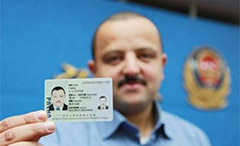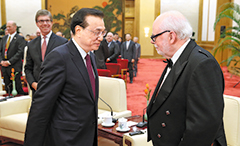Foreigners’ green card path gets smoother
2017-03-22
China Daily
Ahmed Alsayadi, a 31-year-old entrepreneur from Al Bayda, Yemen, has been living in China for more than a decade. But like many other young foreigners in Beijing, he had been unable to get permanent residency because of the high qualification criteria.
“I have been keeping an eye on China’s ‘green card’ policy,” said Alsayadi, co-founder of A Big Dream Entertainment, a big data consultancy service.
Generally, “if a foreigner wants to apply, he or she has to have direct investment in China or be paying a large amount of personal income tax, which is difficult for me,” he said.
However, Alsayadi saw a news report on television last year that said foreign workers at startups or who have been hired by companies in Beijing’s Zhongguancun Science Park could get a recommendation letter for a green card if they met standards of a merit-based point system.
Alsayadi, whose company’s market value is estimated at around 100 million yuan ($14.5 million), immediately submitted his documents and got a recommendation letter.
China began issuing permanent residence permits in 2004. However, the “green card” is among the most difficult to obtain in the world due to the high requirements involved. Between 2004 and 2015, Beijing issued 1,700 permanent residence permits.
To attract more foreign talent and facilitate the development of Zhongguancun, Beijing started a pilot project in March last year that enables foreign startups or skilled professionals in the science park to apply for permanent residency.
The pilot program’s first group of 45 foreigners, including Alsayadi, each gained more than 70 of 100 possible points under the merit system and received recommendation letters in January. Points are based on such factors as education, experience and the demand for certain technological know-how.
Guo Hong, director of the management committee at Zhongguancun, said the program is China’s first trial for evaluating and introducing foreign talent pragmatically.
Zhang Wenqiong, deputy director of the Zhongguancun Talent Center, said the policy focuses mainly on the development potential of startups, along with other factors.
Zheng Jinlian, deputy secretary-general of the Center for China and Globalization, a Beijing think tank, said foreigners now have two windows of opportunity a year to apply for permanent residency.
“The whole process from collecting application materials to completing assessment takes four months,” she said. “We have a group of more than 100 experts to review the application materials.”
Wang Huiyao, director of the Center for China and Globalization, said the new avenue to permanent residency shows the world that China is further opening up and placing more attention on talent recruitment.


